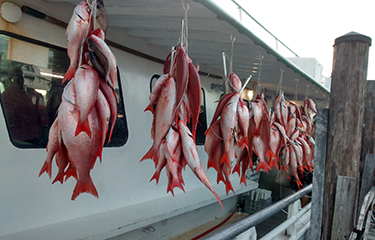While largely supportive of NOAA Fisheries’ plan to expand the Seafood Import Monitoring Program (SIMP), the Southern Shrimp Alliance is opposed to a provision that would make it easier for foreign corporations to secure import permits.
The industry group wants NOAA to restrict International Fisheries Trade Permit (IFTP) to U.S. residents and increase enforcement, a move that could close loopholes that allow foreign corporations to import seafood without meeting traceability requirements.
“For far too long, seafood importers have had free rein to do whatever they wanted. Even now, with SIMP, one importer just told the agency that ‘There is no system that you can come up with to keep people honest on snapper,’” Southern Shrimp Alliance Executive Director John Williams said in a statement. “Pervasive non-compliance with our laws should not result in NOAA Fisheries backing down. This country’s commercial fishing industry knows all too well that NOAA Fisheries enforces laws when it wants to. It is well past time to hold importers to the same standard.”
NOAA’s IFTP enforcement has been weak, the group claims, with multiple permits granted to shell companies and at least one granted to a foreign corporation with no U.S. presence.
Under the new SIMP expansion proposal, foreign corporations would be able to obtain IFTP via their resident agents. The Southern Shrimp Alliance argues that will further dilute the already weak IFTP requirements.
However, the Southern Shrimp Alliance does support NOAA Fisheries’ plan to expand SIMP coverage to more species. Illegal harvests of snapper – one of the species to be added to SIMP – “presents a direct threat” to U.S. commercial shrimp operations, the group claims.
“The U.S. Coast Guard routinely reports interdictions of lanchas crewed by Mexican nationals fishing illegally in U.S. waters, using methods that undermine the conservation measures imposed upon commercial shrimpers with respect to pelagic fish (including red snapper), sea turtles, sharks, and other marine life,” the group said. “Nevertheless, despite these unceasing violations, the value of the U.S. imports of snapper from Mexico has increased since NOAA Fisheries implemented SIMP.”
SIMP was adopted in 2016 as a government effort to combat illegal, unregulated, and unreported (IUU) fishing. The program requires importers show documentation of foreign seafood during inspections at U.S. ports. In theory, the legislation holds seafood imports to the same labeling and sustainability requirements domestic producers and harvesters face, although seafood groups have questioned its effectiveness.
“The simple fact is that in over five years of operation, SIMP has demonstrably failed to identify and halt shipments of illegally harvested or mislabeled product at U.S. ports of entry,” National Fisheries Institute CEO Lisa Wallenda Picard said in comments opposing the proposed expansion. “There is no disputing it: The regulatory agency in charge of the regulation has concluded that the regulation does not fulfill its central purpose, a purpose highlighted in numerous agency – and interagency – materials.”
Despite those concerns, NOAA fisheries is trying to expand the program, doubling the number of species covered under SIMP. The agency introduced its proposal in December 2022, kicking off a 90-day public comment period that was extended to 27 April. More than 2,000 individuals and organizations filed comments.
Some groups, including the Stimson Center and Oceana, have called for NOAA Fisheries to add even more species to SIMP and close loopholes that weaken enforcement.
“NOAA must expand SIMP to all seafood to ensure the United States is only importing seafood that is safe, legally caught, responsibly sourced, and honestly labeled,” environmental group Oceana said in a comment, noting that 85 percent of seafood consumed in America is imported. “NOAA’s proposed rule to expand and improve SIMP has the potential to improve traceability of our seafood through global supply chains and protect American consumers and fishers, but only if it is expanded further to include all seafood imports.”
That aim to include all seafood imports under SIMP has gained congressional support, with the U.S. House of Representatives passing legislation to do just that in February 2022. However, the provision was dropped in the compromise legislation ultimately signed by U.S. President Joe Biden.
Photo courtesy of DeAnne Giesy/Shutterstock







